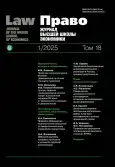Decentralized Autonomous Organizations (DAOs): Challenges of Qualification and Choice of a Law Applicable
- Authors: Krutiy E.1
-
Affiliations:
- Ivanovo Branch, Russian Academy of National Economy and Public Administration under the President of the Russian Federation
- Issue: Vol 18, No 1 (2025)
- Pages: 191-216
- Section: Law in the Modern World
- URL: https://journal-vniispk.ru/2072-8166/article/view/292812
- DOI: https://doi.org/10.17323/2072-8166.2025.1.191.216
- ID: 292812
Cite item
Full Text
Abstract
Decentralized Autonomous Organizations (DAO) are becoming increasingly popular in the Internet space, and with it the recognition in the legal systems of various states. This process is primarily associated with development of the crypto-industry, legalization of mining, including in Russia. The mining can be carried out by entities both independently and by joining mining pools, which have a nature similar to a DAO. The distinctive feature of these organizations is the decentralized nature of management and functioning processes, in which almost all participants of the network community are involved. The activity of DAO is of a cross-border nature, which allows to consider it as a specific subject of private international legal relations. This legal phenomenon requires a separate study of such problems in the PIL as the qualification of DAOs and the resolution of the subsidiary conflict of laws question, as well as the formulation of the main approaches to the choice of applicable law. On the basis of comparative-legal and formal-legal methods the following qualifying features of DAOs are identified and considered: digital form of corporate legal relations, decentralization, autonomy, confidentiality and subordination to lex cryptographica. The optimal solution to the subsidiary conflict of laws question is to qualify the DAO under the law of the country where it was created. If it is impossible to establish the place of the creation of the DAO, then its qualification by lex forum is permitted. The choice of the competent law depends on the type of DAOa. Traditional conflict of laws principles would apply to digital legal entities and legally constituted elements of a hybrid DAO. The law applicable to a “pure” DAO is proposed to be the law governing the underlying agreement between the participants of the network community. Taking into account these approaches, the author attempts to determine the legal status of DAOs and their conflict of laws regulation from the point of view of Russian private law. The DAO is correlated with such corporate forms known to the law as simple partnership, social organization without the status of a legal entity and civil law community.
About the authors
E. Krutiy
Ivanovo Branch, Russian Academy of National Economy and Public Administration under the President of the Russian Federation
Email: ekrutij@yandex.ru
ORCID iD: 0000-0003-4201-5377
References
- Akimova Yu.M. (2015) Principles of international private law. Candidate of Juridical Sciences Thesis. Moscow, 210 p. (in Russ.)
- Ayusheeva I.Z. (2020) Civilian law entities within economy of common consumption. Aktual'nye problémy rossijskogo prava=Issues of Russian Law, vol. 15, no. 6, pp. 95-104 (in Russ.)
- Binetti V.M. (2023) Decentralized autonomous organizations (DAOs): evolution, taxonomy and legal challenges. Roma: Link Campus University, 95 p.
- De Filippi P., Wright A. (2018) Blockchain and the law: the rule of code. Cambridge: Harvard University Press, 312 p.
- Erpyleva N.Yu., Get'man-Pavlova I.V. (2007) International private law. Praktikum. Moscow: Eksmo, 768 p. (in Russ.)
- Get'man-Pavlova I.V. (2024) International private law. Vol. 1. General part. Moscow: Yurait, 320 p. (in Russ.)
- Guillaume F. (2023) Decentralized Autonomous Organizations (DAOs) in front of courts. How can private international law keep up with global digital entities? In: A. Perestrelo de Oliveira, A. Garcia (eds.) DAOs Regulation: Principles and Perspectives for the Future. Tübingen: Mohr Siebeck, pp. 135-168.
- Guillaume F., Riva S. (2023) Blockchain dispute resolution for DAOs: the rise of decentralized autonomous justice. In: A. Bonomi et al. (eds.) Blockchain and Private International Law. Leiden: Brill/Nijhoff, pp. 549-641.
- Hassan S., De Filippi P. (2021) Decentralized Autonomous Organizations. Internet Policy Review, vol. 10, issue 2, pp. 1-10.
- Hassan S., De Filippi P. (2017) The expansion of algorithmic governance: from code is law to law is code. Field Actions Science Reports: The Journal of Field Actions, no. 17, pp. 88-90. Available at: https://ssrn.com/abstract=3117630
- Kasatkina A.S. (2016) The Hague Convention on law applied to trusts and its recognition. Zhurnal zarubezhnogo zakonodatel'stva i sravnitel'nogo pravovedeniya=Journal of Foreign Legislation and Comparative Jurisprudence, no. 5, pp. 44-48 (in Russ.)
- Kondrat'eva E.M. (2019) Trust as classic example of mechanism of tax and hereditary planning. Zakonnost' i pravoporyadok=Legality and Rule of Law, no. 4, pp. 44-50 (in Russ.)
- Kondyrev V.A. (2018) DAOs: new way to decision-making. Cifrovaya ekonomika=Digital Economy, no. 2, pp. 23-30 (in Russ.)
- Mazhorina M.V. (2019) Collision of law and non-law, renovation of lex mercatoria, smart-contracts, and blockchain arbitration. Lex Russica, no. 7, pp. 93-107 (in Russ.)
- Riva S. (2019/2020) DAOs in the Swiss legal order. Yearbook of Private International Law, vol. 21, pp. 601-638.
- Sidorenko E.L. (2024) DAOs in a system of modern law. Lex Russica, vol. 77, no. 1, pp. 119-132 (in Russ.)
- Sojfer T.V. (2018) Non-commercial bodies: aspects of civilian legal personality. Zhurnal rossjskogo prava=Journal of Russian Law, no. 1, pp. 30-39 (in Russ.)
Supplementary files








